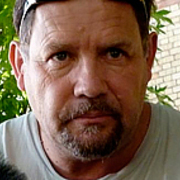
Jim Marbrook
Director Jim Marbrook is best known for his documentary work, which has screened on television and at the NZ round of film festivals. Auckland born and bred, Marbrook began making and studying films in the 90s, while at Concordia University in Montreal. His first short film after returning home, dark drama Jumbo, debuted at the NZ round of film festivals in 1998. It also played in a number of international festivals.
Since 2007 he has lectured in Television, Screen and Communication Studies at Auckland University of Technology, where his research topics include health and the disabled.
Around 2001 Marbrook met Gisborne speed chess maestro Genesis Potini, who was living with a bipolar disorder. Marbrook began “filming his life because I wanted others to see him, to hear his views and to reflect upon his own particular philosophy, a mixture of scripture and the street.”
When Dark Horse debuted at the Napier branch of the film festival, festival head Bill Gosden commented that it would “have been a sure thing” for the Auckland and Wellington festivals had it been completed earlier. Dark Horse went on to win Best Feature at the 2005 DOCNZ International Documentary Festival, and shorter version Genesis Potini screened on disability series Inside Out. Potini’s life would later inspire 2014 Cliff Curtis feature The Dark Horse, which Marbrook co-produced.
His other television work includes Artsville documentary Sons for the Road, which follows a young multi-cultural theatre troupe performing at London’s Royal Court Theatre, and two companion works on health and healing in Whanganui iwi: Awa Hikoi, made while on an international mental health journalism fellowship, and 80-minute long Māori Television doco Ko Whanganui Te Awa, which saw him travelling to Arizona to chronicle exchanges between Māori and US First Nations people. In an interview with website Lumiere, Marbrook describes his "move to documentary came when I found it hard to get any leeway with scripts and producers.”
Marbrook’s researches into mental health eventually led to feature documentary Mental Notes, which chronicles the history of New Zealand’s old psychiatric hospitals. It debuted in 2012 at the New Zealand Film Festival offshoot the World Cinema Showcase, before getting theatrical release. NZ Herald critic Peter Calder praised Marbrook’s “acute visual sense” and the way the film gave voice “to five people who suffered long and hard to earn the right to be called survivors”.
Marbrook followed it with another movie-length documentary, Cap Bocage, which debuted in the 2014 NZ Film Festival. The film explores struggles between New Caledonian environmental organisations and a nickel mining operation. It was nominated for best documentary and best director at the 2014 NZ Film Awards.
In 2020, Marbrook co-wrote and co-produced documentary LOIMATA, The Sweetest Tears with sister Anna, which followed terminally ill Lilo Ema Siopi as she returned to Samoa in the last few weeks of her life. The documentary premiered at Whānau Mārama (the NZ International Film Festival), and screened on Māori TV. it was named Best Documentary at the 2021 NZ Television Awards.
Profile updated on 24 February 2022
Sources include
Peter Calder, ‘World Cinema Showcase 2012: Jim Marbrook’s Mental Notes’ (Interview) - The NZ Herald, 31 March 2012
Peter Calder, ‘Movie review: Mental Notes’ - The NZ Herald, 23 June 2012
Brannavan Gnanalingam, ‘Jim Marbrook on Mental Notes’ (Interview) - Lumiere website. Loaded 6 April 2012. Accessed 30 June 2014
'Speed chess master of Ngati Porou stars in independent documentary' (Press Release) The Big Idea website. Loaded 6 September 2003. Accessed 30 June 2014